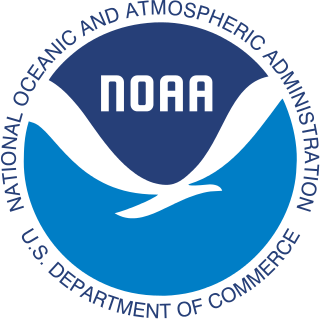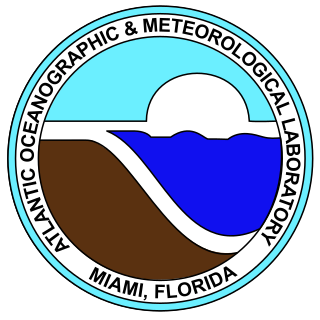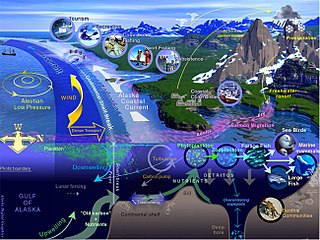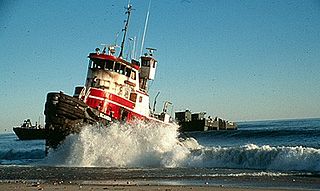
The National Oceanic and Atmospheric Administration is an American scientific agency within the United States Department of Commerce that focuses on the conditions of the oceans, major waterways, and the atmosphere.

A fishery is the enterprise of raising or harvesting fish and other aquatic life. Commercial fisheries include wild fisheries and fish farms, both in fresh water and the oceans. About 500 million people worldwide are economically dependent on fisheries. 171 million tonnes of fish were produced in 2016, but overfishing is an increasing problem -- causing declines in some populations. Recreational fishing is popular in many locations, particularly North America, Europe, New Zealand, and Australia.
The Intergovernmental Oceanographic Commission of UNESCO (IOC/UNESCO) was established by resolution 2.31 adopted by the General Conference of UNESCO. It first met in Paris at Unesco Headquarters from 19 to 27 October 1961. Initially, 40 States became members of the Commission. The IOC assists governments to address their individual and collective ocean and coastal management needs, through the sharing of knowledge, information and technology as well as through the co-ordination of programs and building capacity in ocean and coastal research, observations and services.
The National Ocean Service (NOS), an office within the U.S. Department of Commerce National Oceanic and Atmospheric Administration (NOAA), is responsible for preserving and enhancing the nation's coastal resources and ecosystems along 95,000 miles (153,000 km) of shoreline bordering 3,500,000 square miles (9,100,000 km2) of coastal, Great Lakes, and ocean waters. Its mission is to "provide science-based solutions through collaborative partnerships to address evolving economic, environmental, and social pressures on our oceans and coasts." NOS works closely with many partner agencies to ensure that ocean and coastal areas are safe, healthy, and productive. National Ocean Service scientists, natural resource managers, and specialists ensure safe and efficient marine transportation, promote innovative solutions to protect coastal communities, and conserve marine and coastal places. NOS is a scientific and technical organization of 1,700 scientists, natural resource managers, and specialists in many different fields. NOS delivers a dynamic range of nationwide coastal and Great Lakes scientific, technical, and resource management services in support of safe, healthy, and productive oceans and coasts. NOS develops partnerships to integrate expertise and efforts across all levels of government and with other interests to protect, maintain, and sustain the viability of coastal communities, economies and ecosystems.

The National Marine Fisheries Service (NMFS), informally known as NOAA Fisheries, is the United States federal agency responsible for the stewardship of national marine resources. The agency conserves and manages fisheries to promote sustainability and prevent lost economic potential associated with overfishing, declining species, and degraded habitats.

The Atlantic Oceanographic and Meteorological Laboratory (AOML), a federal research laboratory, is part of National Oceanic and Atmospheric Administration's (NOAA) Office of Oceanic and Atmospheric Research (OAR), located in Miami, Florida. AOML's research spans tropical cyclone and hurricanes, coastal ecosystems, oceans and human health, climate studies, global carbon systems, and ocean observations. It is one of seven NOAA Research Laboratories (RLs).

Marine Protection, Research and Sanctuaries Act of 1972 (MPRSA) or Ocean Dumping Act is one of several key environmental laws passed by the US Congress in 1972. The Act has two essential aims: to regulate intentional ocean disposal of materials, and to authorize any related research. While the MPRSA regulates the ocean dumping of waste and provides for a research program on ocean dumping, it also provides for the designation and regulation of marine sanctuaries. The act regulates the ocean dumping of all material beyond the territorial limit and prevents or strictly limits dumping material that "would adversely affect human health, welfare, or amenities, or the marine environment, ecological systems, or economic potentialities". The MPRSA authorized the Environmental Protection Agency (EPA) to regulate ocean dumping of materials including, but not limited to, industrial waste, sewage sludge, biological agents, radioactive agents, NBC, garbage, chemicals, and biological and laboratory, as well as other wastes, into the territorial waters of the United States through a permit program. The EPA can issue permits for dumping of materials other than dredge spoils if the agency determines, through a full public notice and process, that the discharge will not unreasonably degrade or endanger human health or welfare or the marine environment. The law also has provisions related to creating marine sanctuaries, conducting ocean disposal research and monitoring coastal water quality.

Jane Lubchenco is an American environmental scientist and marine ecologist who teaches and conducts research at Oregon State University. Her research interests include interactions between the environment and human well-being, biodiversity, climate change, and sustainable use of oceans and the planet. From 2009 to 2013, she served as Administrator of NOAA and Under Secretary of Commerce for Oceans and Atmosphere.

Large marine ecosystems (LMEs) are regions of the world's oceans, encompassing coastal areas from river basins and estuaries to the seaward boundaries of continental shelves and the outer margins of the major ocean current systems. They are relatively large regions on the order of 200,000 km² or greater, characterized by distinct bathymetry, hydrography, productivity, and trophically dependent populations. Productivity in LME protected areas is generally higher than in the open ocean.
The Marine Life Protection Act (MLPA) was passed in 1999 and is part of the California Fish and Game Code. The MLPA requires California to reevaluate all existing marine protected areas (MPAs) and potentially design new MPAs that together function as a statewide network. The MLPA has clear guidance associated with the development of this MPA network. MPAs are developed on a regional basis with MLPA and MPA-specific goals in mind and are evaluated over time to assess their effectiveness in meeting these goals. The main six goals of the Marine Life Protection Act are to maintain the diversity of marine ecosystems, conserve its populations, better educate people on human-marine life interactions, protect habitats, and effectively enforce MPAs. The establishment of this policy is an important step in expanding science-based management and decision making regarding policies.

The Ocean Observatories Initiative (OOI) is a National Science Foundation (NSF) Division of Ocean Sciences program that focuses the science, technology, education and outreach of an emerging network of science driven ocean observing systems. The OOI delivers real-time data from more than 800 instruments to address critical science questions regarding the world’s ocean. OOI data are freely available online to anyone with an Internet connection.

The Northern Gulf Institute (NGI) is a National Oceanic and Atmospheric Administration (NOAA) Cooperative Institute started in October 2006. It is one of 16 NOAA Cooperative Institutes (CIs). The NGI is a partnership of six academic institutions and NOAA. The collaboration led by Mississippi State University (MSU), includes the University of Southern Mississippi (USM), Louisiana State University (LSU), Florida State University (FSU), the University of Alabama in Huntsville, and the Dauphin Island Sea Lab (DISL). The NGI defines the Northern Gulf of Mexico region as the upland, watershed, coastal zone, and coastal ocean areas from the Sabine River in Louisiana east to the Suwannee River in Florida.
The Joint Ocean Commission Initiative is a bipartisan, collaborative group in the United States that aims to "accelerate the pace of change that results in meaningful ocean policy reform." The Joint Initiative was established by the members of two major U.S.-based oceans commissions: the Pew Oceans Commission and the United States Commission on Ocean Policy. It was originally co-chaired by former White House Chief of Staff Leon Panetta and former Chief of Naval Operations Admiral James D. Watkins, chairs of the Pew and U.S. Ocean Commissions, respectively. Currently, the Joint Initiative is led by a Leadership Council, which is co-chaired by Christine Todd Whitman, former EPA Administrator under President George W. Bush and former governor of New Jersey, and Norman Y. Mineta, Secretary of Commerce under President Bill Clinton and Secretary of Transportation under President George W. Bush.

Marine spatial planning (MSP) is a process that brings together multiple users of the ocean – including energy, industry, government, conservation and recreation – to make informed and coordinated decisions about how to use marine resources sustainably. MSP generally uses maps to create a more comprehensive picture of a marine area – identifying where and how an ocean area is being used and what natural resources and habitat exist. It is similar to land-use planning, but for marine waters.
Defying Ocean's End (DOE) is a global agenda for action in marine conservation compiled in a 2004 Island Press book. It is also the title of a 2003 Los Cabos (Mexico) conference, where the agenda was formulated.

The North Cape oil spill took place on January 19, 1996, when the tank barge North Cape and the tug Scandia grounded on Moonstone Beach in South Kingstown, Rhode Island, after the tug caught fire in its engine room during a winter storm. An estimated 828,000 US gallons (3,130 m3) of home heating oil was spilled. Oil spread throughout a large area of Block Island Sound, including Trustom Pond National Wildlife Refuge, resulting in the closure of a 250-square-mile (650 km2) area of the sound for fishing.

The Coastal States Organization (CSO) is a U.S. non-profit organization located in Washington D.C. that represents the Governors of the nation's thirty-five coastal states, commonwealths and territories. CSO represents the Governors on legislative and policy issues relating to the sound management of coastal, Great Lakes and ocean resources. It contributes to the development of coastal zone management legislation and programs.

Linwood Pendleton, an American environmental economist, is the Senior Vice-President for Science at the Centre for the 4th Industrial Revolution and until October 2020 was the World Wildlife Fund (WWF) Global Oceans Lead Scientist. He works across the WWF network and with partners to integrate science and research into ocean conservation strategy and initiatives. Since October 2014, Pendleton has served as International Chair in Marine Ecosystem Services at the Laboratory of Excellence and European Institute for Marine Studies. He is also a senior fellow at Duke's Nicholas Institute for Environmental Policy Solutions (NIEPS) and Adjunct Associate Professor at the Duke University Marine Laboratory, part of NIEPS. He previously served as the Director of Ocean and Coastal Policy for the Nicholas Institute (2009-2013) and was the founder of the Marine Ecosystem Services Partnership. Pendleton was the Acting Chief Economist for the National Oceanic and Atmospheric Administration (NOAA) from 2011-2013.
California Ocean Science Trust (OST) is a nonprofit 501(c)(3) public-benefit corporation established pursuant to the California Ocean Resources Stewardship Act (CORSA) of 2000. The mission of OST is to advance a constructive role for science in decision-making by promoting collaboration and mutual understanding among scientists, citizens, managers, and policymakers working toward sustained, healthy, and productive coastal and ocean ecosystems. Because OST is not a government entity, it can act as an independent and unbiased broker between policymakers and managers, and the scientific community.













